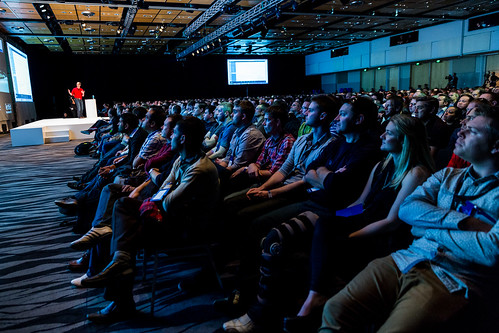Conferences Are Providing Inferior Education Through Lectures
Conferences are providing inferior education if all they provide is didactic, presenter monologue lectures.
Yes, that’s right. The speaker lecture is ineffective and inferior! If all your attendees do is sit and listen passively to speakers, you’re providing bad conference education!
At least that’s what 2001 Physics Nobel Prize recipient, Stanford professor and former director for science at the White House Office of Science and Technology Policy Carl Weiman says regarding lectures. Weiman goes on to say that the public needs to know and understand that lectures are an inferior method of education. And they are just as inferior for the STEM (science, technology, engineering, mathematics and medical) groups!
Conferences Need To Take The Lecture Research Seriously
The research is strong, loud and clear that lectures do not lead to learning or attitude, behavior and skill change.
Researcher and professor Donald Bligh has written about the effectiveness of peer discussion and the ineffectiveness of lectures for learning for years.
A new research paper recently released in the May 2014 journal of PNAS provides compelling and convincing evidence that active learning is far superior to the lecture! Researcher Scott Freeman of the University of Washington in Seattle and his colleagues analyzed data from 225 studies about lectures and active learning. They discovered that:
- Learners in lectures are 1.5 times more likely to fail than those taking active learning education
- 55% more learners fail lecture based STEM education sessions than those with active learning
- Across all subjects, more than one-third of learners fail lecture based sessions as compared to one-fifth of those in active, participatory education
- Learners in active education sessions where the audience participates in activities, discussion and reflective exercises score 6 percent higher on exams than those in lectures.
In short, the lecture is ineffective says Weiman.
“A lecture is basically a talking textbook,” he adds.
Active Learning Applies To All Education
Some may read the research and say it only applies to young adults in college. Not so, says Weiman.
“The same principles of how people learn applies to all education levels,” expresses Weiman.
MIT physics classes dumped the traditional lecture in 2009 in favor of active, hands-on, exploratory learning methods. Attendance in their physics classes increased and failure rate dropped by 50%. Other universities followed including Rensselaer Polytechnic Institute, North Carolina State University, the University of Maryland, the University of Colorado at Boulder and Harvard.
But conferences have been slow to make the change. The lecture is still the primary cornerstone of the conference education offering.
Dump The Lecture For More Interactive Education
It is time for conference organizers to stop lecturing at their audiences!
It’s time to make the shift from primarily providing lecture-based education to offering a mix of active and passive sessions.
It’s time to dump the lecture for more audience participatory education.
And remember, active education does not automatically mean smaller classroom sizes. Active education can scale!
Why do some CEOs and conference owners refuse to acknowledge and adopt the research about the ineffectiveness of lectures? What steps do conference organizers need to take to transition to active education sessions?



[…] do we continue to secure speakers that insist that their lecture-based methods work even though the research clearly shows the […]
[…] learning is a rethinking of the traditional method of transmission and reception of information. Research shows that the traditional lecture leads to a loss in learning. We know that effective education […]
[…] “If it worked for me, it will work for them,” is shoved on to soapboxes as “the one true-and-tried method.” […]
[…] strategies of choice for conference education. This is a major problem because we now know from the neuroscience and evidenced based education research that learning is social. It occurs through thinking, reflection, application and feedback. And it […]
[…] remain the strategies of choice for education. This is a major problem because we now know from the neuroscience and evidenced based education research that learning is social. It occurs through application, feedback, reflection and thinking. It […]